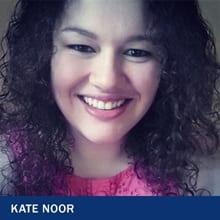
The MBA That Fits Your Life
- Just over $19K total tuition
- Earn credentials along the way
- No application fee or SAT/ACT scores
- Aligns with SHRM BoCK key competencies1
- Complete in about 1 year
- No GRE/GMAT required
MBA in HR Online Program Overview
A human resources concentration built into an MBA? That's the type of degree that can fit well into your career-advancement goals.
The Master of Business Administration (MBA) in Human Resources at Southern New Hampshire University prepares you to take on this increasingly important role. And because it’s an MBA, its approach to the HR discipline is to enhance your business acumen first and foremost, along with your ability to drive change.
The program lays a foundation in standard business administration topics, weaving topics like leadership, marketing, finance and operations throughout your coursework. You'll dive into them in different ways. For example, you won't just learn about leadership, you'll learn how to lead people, organizations and organizational change.
The comprehensive nature of this program makes it a great option for anyone interested in honing their business skill sets, strengthening marketability and increasing career opportunities – whether you're a recent undergraduate, a well-established professional or somewhere in between.
With only 30 credits required to graduate for just over $19k, the new MBA program also allows you to move through your core coursework faster and for less, even giving you the ability to finish in about a year should you choose to take part full time.
However, despite the accelerated timeline, you can still anticipate the same level of rigor and complexity that you would find in a traditional MBA, allowing you to get the most out of your program in the least amount of time.
"Everything is business as you progress up the ranks of leadership,” said Kate Noor, an MBA academic advisor at SNHU.
As with all of our HR programs, the MBA in Human Resources aligns with SHRM’s guiding principle – that human resource professionals must be prepared to play a key role in the success of today's agile companies. SHRM is considered the industry standard in HR credentialing.
The coursework was designed to include competencies found in the SHRM Book of Competency and Knowledge (SHRM BoCK™), which forms the basis for SHRM-issued HR credentialing opportunities. The SHRM BoCK covers the 8 behavioral competencies and HR knowledge human resources professionals need to do their best work.1
Melanie Rowe ’18G says her MBA in HR prepared her on many levels.
“The classes at SNHU have taught me a lot about change management, people management, group dynamics, company culture and leadership,” she said. “I’ve used this knowledge in my relationship management and to position myself as an informal leader, which makes it easier for me to recommend and implement change.”
What You'll Learn
- The complexities of HR management
- Data analysis and interpretation
- Adaptable strategies for an organization
- The cultivation of culturally aware and responsive teams
- Plans around culture, ethical and legal standards, and sustainable practices
How You'll Learn
At SNHU, you'll get support from day 1 to graduation and beyond. And with no set class times, 24/7 access to the online classroom and helpful learning resources along the way, you'll have everything you need to reach your goals.
Career Outlook
The HR role will continue to evolve as companies in every industry adjust to the long-term effects of events like the COVID-19 pandemic.
But whether the workforce expands or contracts as organizations retool, there could always be demand for strong human resource leadership.
Results from the 2021 Graduate Management Admission Council (GMAC) Demand for Graduate Management Talent Survey show that businesses are seeking qualified MBA degree holders to assist with organizational restructuring fueled by the pandemic. And according to the 2021 GMAC Enrolled Student Survey, almost 8 in 10 enrolled students who responded agree that a graduate business education is a worthwhile investment, even in times of economic uncertainty.2
Likewise, most survey respondents feel confident in their employability in the face of the many challenges imposed by the global pandemic.2
This speaks to the value that earning your MBA in Human Resources can add to your resume, despite the ever-changing landscape. It's one of the most respected and versatile degrees in business, and it can help qualify you for a number of roles at the management level or above by furnishing you with both the strategic and soft skills needed to succeed in times of uncertainty.
Some of the top needed skills from MBA degree holders include leadership, strategy and innovation, decision making, and strategic and systems skills, according to GMAC.2 All of these skills are woven into SNHU's MBA in HR, plus embedded industry-aligned credentials are offered in many of these key areas.

“HR professionals need to understand business and think business first,” she said. “They also need to recognize that almost everything they need to do is to be done through other people – line managers, employees and their colleagues. Hence, they need to be able to build effective influencing and relationship skills.”
Earning your MBA in Human Resources can prepare you to pursue a variety of positions, including:
- Human resources manager
- Human resources director
- Human resources consultant
- Compensation and benefits manager
- Training and development manager
- Operations management
The outlook is good for these roles. According to the 2021 GMAC Demand for Graduate Management Talent Survey, demand for graduate management talent is returning to pre-pandemic levels.2 So whether you’re entering the HR field or looking to step up into management with your current employer, the MBA in HR can take you in a number of directions.
You’ll find your MBA HR degree opens doors in managerial and executive positions across a diverse range of industries. According to the BLS,3 those industries include:
- Educational services – state, local and private
- Finance and insurance
- Government
- Healthcare and social assistance
- Management of companies and enterprises
- Manufacturing
- Professional, scientific and technical services
Results from the 2021 GMAC Demand for Graduate Management Talent Survey also show that growth in the technology sector specifically has fueled the hiring of business school graduates.2
The beauty of an MBA in Human Resources is its versatility to cut across industries and areas of interest.
“A student’s decision to be in one industry or another has to do with their passions,” said Gogliettino. “I like mission-driven organizations. I like the multi-layers of complex issues you get in healthcare. But a student who’s adept at HR can work in any industry.”
If the C-suite is in your sights, an MBA in HR can help you get there faster. While every business values people management skills, many employers place greater emphasis on the ability to manage programs that affect their entire workforce. And, according to the BLS, employers generally compensate better for these skill sets.2
However, no matter which direction or industry you choose, MBA degree holders command some of the highest average starting salaries according to GMAC, with a median starting salary of $115,000.2 So not only is the program designed to equip you with the necessary skills to excel in business and HR, getting your MBA in HR degree could lead to higher earning potential.
Job Growth and Salary
The MBA in HR could put you on a growing, lucrative path.
Job Growth
The outlook looks good for roles through 20323:
- Human resources managers: 5% job growth
- Training and development managers: 6% job growth
Salary
And the 2022 median salaries for jobs were much higher than the pay of all workers combined3:
- Human resource managers: $130,000
- Training and development managers: $120,000
Understanding the Numbers
When reviewing job growth and salary information, it’s important to remember that actual numbers can vary due to many different factors — like years of experience in the role, industry of employment, geographic location, worker skill and economic conditions. Cited projections do not guarantee actual salary or job growth.
Where Could You Work?
Some of the largest employers of HR managers are:
Professional, Scientific and Technical Services
Provide a number of services, such as payroll, consulting, training and acquisition, among other roles.
Corporations and Enterprises
Serve in an HR leadership position that gives you the opportunity to make decisions that can move organizations forward.
Manufacturing
Manage HR functions in an industry that you're passionate about, like computers, furniture, textiles, food and more.
Healthcare
Become an HR leader in a fast-growing field, making employee-focused, data-driven decisions aimed at improving patient outcomes.
Start Your Journey Towards an Online Human Resources Degree
Why SNHU for Your MBA in Human Resources Online
Flexible
With no set class meeting times, you can learn on your schedule and access online course materials 24/7.
Affordable
As part of our mission to make higher education more accessible, we’re committed to keeping our tuition rates low. In fact, we offer some of the lowest online tuition rates in the nation.
Prior coursework and work experience could also help you save time and money. SNHU’s transfer policy allows you to transfer up to 12 credits from your previous institution. You could also earn college credit for previous work experience.
Respected
Founded in 1932, Southern New Hampshire University is a private, nonprofit institution with over 160,000 graduates across the country. SNHU is accredited by the New England Commission of Higher Education (NECHE), a regional accreditor, which advocates for institutional improvement and public assurance of quality.
Recently, SNHU has been nationally recognized for leading the way toward more innovative, affordable and achievable education:
- “Most Innovative” regional university honors from U.S. News & World Report each year since 2015
- A $1 million grant from Google.org to explore soft skills assessments for high-need youth
- Recognition as a 2017 Digital Learning Innovator by the Online Learning Consortium
Network
At Southern New Hampshire University, you'll have access to a powerful network of more than 300,000 students, alumni and staff that can help support you long after graduation. Our instructors offer relevant, real-world expertise to help you understand and navigate the field. Plus, with our growing, nationwide alumni network, you'll have the potential to tap into a number of internship and career opportunities.
93.6% of online students would recommend SNHU (according to a 2022 survey with 17,000+ respondents). Discover why SNHU may be right for you.
Admission Requirements
Expanding access to quality higher education means removing the barriers that may stand between you and your degree. That’s why you can apply at any time and get a decision within days of submitting all required materials:
- Completed free application
- Undergraduate transcripts, which we can retrieve for you by submitting a transcript request form
Acceptance decisions are made on a rolling basis throughout the year for our 5 graduate terms.
How to Apply
If you’re ready to apply, follow these simple steps to get the process going:
- Complete free graduate application
- Submit undergraduate transcripts
- Work with an admission counselor to explore financial options and walk through application process

What SNHU Graduates are Saying
Melanie Rowe ’18G
“As a director, it’s important to have a good business foundation in addition to expertise in your field. SNHU’s MBA program allows me to take the core business classes I need to be a director in addition to the HR classes I would take if I was just pursuing a master’s degree in HR.”
Courses & Curriculum
The business world needs well-educated human resource professionals more than ever.
SNHU's MBA in Human Resources online was designed to expand your expertise on a wide range of human resource management topics. Like all of our online MBA programs, it explores today’s most relevant themes, including ethics and corporate social responsibility, leadership, strategy, management, technology and innovation. And because it’s an online program, it allows you to build relationships with a diverse group of students while enhancing the “soft skills” that are so essential to success in business.

The MBA in HR consists of 7 core MBA courses and 3 human resource courses. Depending on your academic background, you may need to supplement the core courses with business foundation coursework. However, those with a bachelor’s in business administration, human resources or a related area may be able to waive one or more foundations – and jump into the core more quickly.
The MBA in HR program follows the same structure as our other MBA programs, allowing you to:
- Earn credentials embedded throughout the program. Not only gain a master's degree, but build up your resume along the way with industry-recognized certifications in tools like Power BI, MS Excel and Tableau – plus, enhancement of soft skills like human intelligence and strategy implementation.
- Take part in scenario-based learning. Using both disciplinary and interdisciplinary knowledge, as well as creative thinking and problem-solving skills, you'll participate in interactive scenarios that provide you with real-world experience, while receiving guidance from professors with real-world expertise.
- Participate in a flex learning pathway. You'll get more fluidity in assignment due dates. Some even span across multiple modules with related themes, allowing you to draw relationships between business principles.
- Learn through multimedia exposure. Strengthen your understanding of complex topics with animations, video communication tools and videos featuring industry leaders sharing business insights.
- Access timely resources. Take advantage of hand-selected, relevant resource material from leading professional organizations and publications.
The MBA human resource management concentration stresses the strategic nature of the HR role. You’ll learn how the HR system helps drive the overall organizational mission and see its impact from both a human resource and business perspective. Broad themes include:
- Strategic decision-making
- Market-driven connectivity
- Human resources technology
- Recruitment and hiring
- Compensation and benefits
The human resource courses that make up SNHU’s concentration align with the guiding principles of the Society for Human Resource Management (SHRM), the industry standard in HR credentialing. Coursework emphasizes competencies in the SHRM Book of Competency and Knowledge (SHRM BoCK™), which forms the basis for SHRM credentials.1
As you progress through the MBA in HR program, you may take these 3 concentration courses:
- Strategic Human Resource Management: Examine key regulatory procedures and human resource requirements as they apply to organizations. Analyze the strategic role of the HR manager in recruitment, hiring, training, career development and other functions within the organizational setting.
- Total Rewards: Examine the impact of compensation and benefits within the organizational structure to design a compensation and benefits program. Topics include job analysis, surveys, wage scales, incentives, benefits, human resource information systems (HRIS) and pay delivery administration.
- Leading Change: Discover the various techniques and strategies used to effect systematic change and transform organizations. Coursework integrates Kotter's processes for leading change, organizational development and transformation theory and practice, emphasizing the use of teams as a key change factor.
As you complete your MBA in Human Resources concentration courses, you’ll learn to lead and operate within cross-functional teams by effectively navigating the complexities of HR management.
“HR is complex, because it has a lot of different variables to it,” said Deborah Gogliettino, SNHU’s associate dean for human resources. “It’s not something you can wing. You have to know the business plus employment laws, federal and state. You answer questions every day in your work.”
Melanie Rowe '18G works for a nonprofit and believes “it’s important to have a good business foundation in addition to expertise in your field.” She most enjoys working in compliance, because she likes “being involved in the action."
“Compliance lets me get involved in every department in the organization,” she said. “I get to learn how everything functions, help fix things that aren’t working and ensure that our process and programs are supporting the organization’s sustainability.”
SNHU also offers a graduate certificate in human resource management, which MBA in HR students can take as a standalone or fold into their program with minimal additional courses. Taking advantage of this opportunity lets you walk away with not one but two in-demand credentials. Together, these two credentials provide robust competency in multiple areas of business as well as HR – an ideal way to increase your knowledge, skills and marketability.
Don't have a business background? No problem. Our MBA is accessible to everyone. Interested students must have a conferred undergraduate degree for acceptance, but it can be in any field. Those without an undergraduate degree in business or a related field may be asked to complete up to 2 foundation courses to get started. These foundations cover essential business skill sets and can be used to satisfy elective requirements for the general-track MBA. With foundations, the maximum length of your online MBA would be 36 credits.
Attend full time or part time. Students in the MBA have the option to enroll full time (at 2 classes per term) or part time (with 1 class per term). Full-time students should be able to complete the program in about 1 year, while part-time students could finish in about 2 years. Our students are busy, often juggling jobs, family and other obligations, so you may want to work with your academic advisor to identify the course plan that works for you. The good news is, you can switch from full time to part time and back again as often as you want.
| View Full Curriculum in the Catalog |
|---|
| MBA - Human Resources |
| Courses May Include | ||
|---|---|---|
| MBA Human Resources | ||
| MBA 530 | Leading People and Organizations | Impactful leaders have the ability to define direction, understand their uniqueness, communicate effectively, and use emotional intelligence to lead people, teams, and organizations. Students will explore leadership theories, issues, and trends, while also applying evidence-based methodologies and tools to assess and elevate their personal leadership plan. By connecting leadership theories and methodologies to trends, challenges, and opportunities facing leadership, this course will help students to effectively lead and empower others. |
| MBA 699 | Strategic Opportunity Management | Impactful leaders move strategic initiatives forward with innovation, collaboration, and informed, data-driven decision-making. In this course, students will assess conditions, processes, and resources that impact how leaders design adaptive strategies, using emotional and business intelligence to manage strategic objectives. Students will solve complex problems, manage opportunities, and build sustainable stakeholder relationships. |
| OL 600 | Strategic Human Resource Management | Examine key regulatory procedures and human resource requirements as they relate to applications in organizations. Analyze the strategic role of the human resource manager in performing functions of recruitment, hiring, training, career development and other contemporary processes within the organizational setting. Study concepts aligned with the Society for Human Resource Management (SHRM) Body of Competency and Knowledge (BoCK). |
| OL 620 | Total Rewards | This course examines the compensation and benefits functions within the organizational structure and ways they impact the management function. Topics include job analysis, surveys, wage scales, incentives, benefits, HRIS systems and pay delivery administration. Students design a compensation and benefits program as a course outcome. |
| OL 663 | Leading Change | This course focuses on transforming organizations by introducing Kotter's eight processes by which leaders effect change. Because organizations, leaders, and employees differ, various techniques and strategies are examined. The course integrates Kotter's processes for leading change, organizational development and transformation theory and practice, and analysis of an organization which has effected systematic change. The use of work teams as a key change factor will have special emphasis. |
| Total Credits: 30 | ||
Minimum Hardware Requirements
|
Component Type |
PC (Windows OS) |
Apple (Mac OS) |
|---|---|---|
|
Operating System |
Currently supported operating system from Microsoft. |
Currently supported operating system from Apple. |
|
Memory (RAM) |
8GB or higher |
8GB or higher |
|
Hard Drive |
100GB or higher |
100GB or higher |
|
Antivirus Software |
Required for campus students. Strongly recommended for online students. |
Required for campus students. Strongly recommended for online students. |
|
SNHU Purchase Programs |
||
|
Internet/ Bandwidth |
5 Mbps Download, 1 Mbps Upload and less than 100 ms Latency |
5 Mbps Download, 1 Mbps Upload and less than 100 ms Latency |
Notes:
- Laptop or desktop? Whichever you choose depends on your personal preference and work style, though laptops tend to offer more flexibility.
- Note: Chromebooks (Chrome OS) and iPads (iOS) do not meet the minimum requirements for coursework at SNHU. These offer limited functionality and do not work with some course technologies. They are not acceptable as the only device you use for coursework. While these devices are convenient and may be used for some course functions, they cannot be your primary device. SNHU does, however, have an affordable laptop option that it recommends: Dell Latitude 3301 with Windows 10.
- Office 365 Pro Plus is available free of charge to all SNHU students and faculty. The Office suite will remain free while you are a student at SNHU. Upon graduation you may convert to a paid subscription if you wish. Terms subject to change at Microsoft's discretion. Review system requirements for Microsoft 365 plans for business, education and government.
- Antivirus software: Check with your ISP as they may offer antivirus software free of charge to subscribers.
Master of Business Administration (MBA) Technical Requirements
Video Communication Platform:
- Mac or PC desktop or laptop (not a mobile device or tablet)
- Webcam
- Microphone
- Required: At least 1 Mbps upload/download speed
- Learn more about our detailed technical requirements
Internet Connectivity for Virtual Labs:
- Recommended: 5Mbps upload/download speed with less than 40ms latency
University Accreditation

Tuition & Fees
Tuition rates for SNHU's online degree programs are among the lowest in the nation. We offer a 25% tuition discount for U.S. service members, both full and part time, and the spouses of those on active duty.
| Online Graduate Programs | Per Course | Per Credit Hour | Annual Cost for 15 credits |
|---|---|---|---|
| Degree/Certificates | $1,911 | $637 | $9,555 |
|
Degree/Certificates (U.S. service members, both full and part time, and the spouses of those on active duty)* |
$1,410 | $470 | $7,050 |
Tuition rates are subject to change and are reviewed annually.
*Note: students receiving this rate are not eligible for additional discounts.
Additional Costs:
Course Materials ($ varies by course). Foundational courses may be required based on your undergraduate course history, which may result in additional cost.
Frequently Asked Questions
What can you do with an MBA in Human Resources?
Whether you’re entering the HR field or looking to step up into a management position, the MBA in Human Resources can take you in a number of directions.
Common roles to consider include:
- Human resource managers: The link between employees and management, HR managers handle hiring and recruitment, and oversee staffing issues and benefits programs. The U.S. Bureau of Labor Statistics projects 5% growth for this role through 2032 and has a 2022 median annual salary of $130,000. Note: Higher-level positions may require a master’s degree in human resources, labor relations or business administration (MBA).3
- Compensation and benefits managers: According to the BLS, compensation and benefits managers set an organization’s pay and benefits structure, monitor wage rates and ensure compliance with government regulations. The BLS projects 2% job growth for this specialized role through 2032 and had a 2022 median salary of $131,280.3
- Training and development managers: They oversee training programs, staff and budgets, often working with top executives and financial managers to identify and match training priorities with overall business goals. The BLS projects 6% job growth for this occupation through 2032 and had a 2022 median salary of $120,000.3
Where can I get a master's in human resources?
While you have many options for a master's in human resources, start by ensuring the program is accredited by the Accreditation Council for Business Schools and Programs (ACBSP), the industry's leading accreditation council.
In addition to an MBA in Human Resources, Southern New Hampshire University offers master's in human resource management. Both programs are accredited by ACBSP and align with SHRM’s guiding principle – that human resource professionals must be prepared to play a key role in the success of today's agile companies.
Is HR a good career choice?
Yes, HR continues to be an excellent career choice. The U.S. Bureau of Labor Statistics projects 5% job growth for human resource managers through 2032 and had a 2022 median salary of $130,000.3
Related roles, such as compensation and benefits managers, also show steady demand and high income potential, earning a 2022 median salary of $131,280.3
Of course, if you're not ready for a master's degree, you can still get your foot in the door with an undergraduate human resources degree online, or boost your professional credentials with an online HR certification.
Two key workforce trends are fueling demands for HR managers: human resource information systems (HRIS) and financial wellness. SNHU’s MBA in Human Resources addresses both areas.
With the growing use of cloud-based human resources technology, HR professionals need to develop fluency in this area. Deborah Gogliettino, SNHU’s associate dean for human resources, says a business student with IT skills can get into HR systems or analysis within a couple of years – and command a higher salary.
Gogliettino says change in employee wellness has fueled the financial wellness trend. “There’s still a focus on work/life balance, but now there’s a heightened focus in upcoming generations interested in financial literacy.”
Which is better, an MBA or MHRM?
Where do you want to take your career? Do you want more flexibility to move around in the workforce, or do you want to move up the ladder in HR? Understanding what you want in future roles should help you determine which path is best for you.
An MBA can give you a more well-rounded business education, where you'll study topics like strategy, accounting and marketing within your coursework. An MBA can be useful across all industries and throughout many types of organizations. At Southern New Hampshire University, you also have the option to add a 3-course concentration – like HR – to your program, helping you build the skill set you need for your current goals.
A master's in human resource management (MHRM), on the other hand, focuses solely on HR. You'd learn how to focus on an organization's mission, vision and goals. And you'd gain skills like negotiation, global and cultural context, legal and ethical principles, communication and strategy.
Deborah Gogliettino, SNHU’s associate dean for human resources, advises anyone with higher aspirations in HR to “go get your master’s in HR. … When you start to move forward, you can start to see how your ideas can take shape.”
How much does a master's in HR cost?
You have many options when it comes to pursuing a master’s in HR. The difference comes down to where and how you pursue your degree. Generally, the price tag for online programs runs lower than traditional on campus programs.
At $637 per credit, Southern New Hampshire University's 30-credit MBA in Human Resources costs just $19,110 in tuition. That makes it one of the most affordable MBA programs in the country!
While SNHU's MBA in Human Resources program was designed for anyone with a bachelor's degree, if you don't have a business background, you may be asked to take 1 or 2 foundation courses to help set you up for success. These classes fall outside of the MBA program curriculum.
For total costs, the only additional investments would be your class resources. There's no application fee and no extra costs for required technologies, saving you even more money on the path to your master's.
SNHU's mission is to expand access to education, and keeping tuition rates low is just one of the ways it helps you get you where you want to go.
Related Articles

SNHU Spotlight: Jeffrey Harris, MBA Grad

SNHU Spotlight: Luis Polanco, BS in Business Administration Grad

SNHU Spotlight: Lynda Jarrett, BS in Business Administration Grad
References
Sources & Citations (1, 2, 3)
1Society for HR Management (SHRM), on the internet, at:
- https://www.shrm.org/certification/about/body-of-competency-and-knowledge/Pages/default.aspx (viewed Jan. 26, 2022)
- https://www.shrm.org/hr-today/trends-and-forecasting/research-and-surveys/documents/shrm%20skills%20gap%202019.pdf (viewed Jan. 26, 2022)
- https://www.shrm.org/hr-today/trends-and-forecasting/research-and-surveys/documents/20-0993%20next%20chapter%20covid-19.pdf (viewed Jan. 26, 2022)
2Graduate Management Admission Council (GMAC), on the internet, at:
- https://www.gmac.com/-/media/files/gmac/research/enrolled-students/2021_gmac_enrolledstudentsurvey_report.pdf (viewed Jan. 27, 2022)
- https://www.gmac.com/-/media/files/gmac/research/employment-outlook/2021_crs-demand-of-gm-talent.pdf (viewed Jan. 27, 2022)
3Bureau of Labor Statistics, U.S. Department of Labor, Occupational Outlook Handbook, on the internet, at:
- https://www.bls.gov/ooh/management/human-resources-managers.htm (viewed Nov. 8, 2023)
- https://www.bls.gov/ooh/management/compensation-and-benefits-managers.htm (viewed Nov. 8, 2023)
- https://www.bls.gov/ooh/management/training-and-development-managers.htm (viewed Nov. 8, 2023)
Cited projections may not reflect local and/or short-term economic or job conditions and do not guarantee actual job growth.

